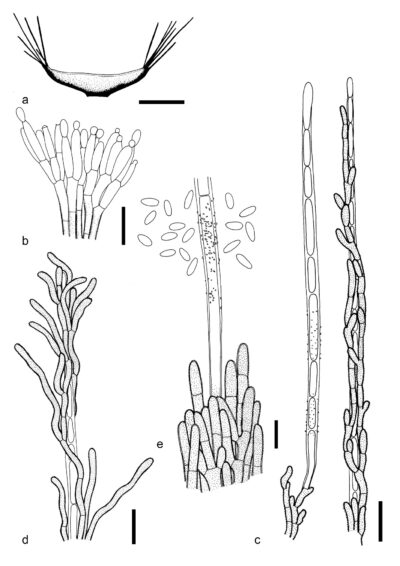Fungalpedia – Note 323, Smaragdiniseta
Smaragdiniseta L. Lombard & Crous
Citation when using this entry: Perera et al. 2024 (in prep) – Fungalpedia, genera described in 2016.
Index Fungorum, Facesoffungi, MycoBank, GenBank, Fig. 1
Classification: Stachybotryaceae, Hypocreales, Hypocreomycetidae, Sordariomycetes, Pezizomycotina, Ascomycota, Fungi.
Lombard et al. (2016) established Smaragdiniseta to accommodate Myrothecium bisetosum. Myrothecium bisetosum formed a distinct lineage sister to the Albifimbria clade, distant from Myrothecium s. str. clade in the phylogenetic analysis of the cmdA, ITS, rpb2, and tub2 loci (Lombard et al. 2016). Smaragdiniseta is characterized by stromatic sporodochial conidiomata that occur superficially and are scattered to gregarious on the substrate. They are cupulate, oval to elongated, or irregular in outline. The stroma is well developed and hyaline, with globulosa or angularis texture. Sporodochia are surrounded by two types of setae that enclose olivaceous to dark green slimy masses of conidia. Type I setae are compacted, emerald green, thick-walled and verrucose. Type II setae arise from the marginal hyphae and taper to an obtuse apex, are hyaline, septate, thick-walled and smooth to lightly verrucose. They soon became overgrown by the setae of the first type. Conidiophores are macronematous, irregular, verticillately or penicillately branched, hyaline, and smooth-walled. The conidiogenous cells are phialidic, hyaline, smooth-walled, cylindrical, narrower towards the apex and they lack conspicuous collarettes and periclinal thickenings. The conidia are aseptate, obclavate to narrowly ellipsoidal, hyaline, and smooth-walled. The sexual morph remains undetermined (Rao and De Hoog 1983; Lombard et al. 2016). Smaragdiniseta species are saprobes in dead plant parts (Rao and De Hoog 1983; Samarakoon et al. 2022). This genus includes two species (Lombard et al. 2016; Samarakoon et al. 2022).
Type species: Smaragdiniseta bisetosa (V.G. Rao & de Hoog) L. Lombard & Crous
Other accepted species:
- Smaragdiniseta musae B.C. Samar. & Chomnunti
Figure 1 – Smaragdiniseta bisetosa (CBS 459.82, holotype). a Sporodochium. b Conidiophores. c, d Setae in various stages of development. e Detail of marginal hyphae with seta. f Scale bars: a = 100 μm, b = 10 μm, c, d = 25 μm, e = 10 μm. Redrawn from Rao & De Hoog (1983)
References
Entry by
Rekhani Hansika Perera, Center of Excellence in Fungal Research, Mae Fah Luang University, Chiang Rai, 57100, Thailand.
(Edited by Kevin D. Hyde, Samaneh Chaharmiri-Dokhaharani, & Achala R. Rathnayaka)
Published online 27 August 2024
